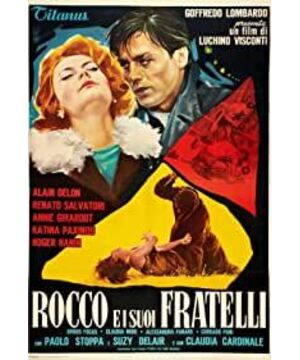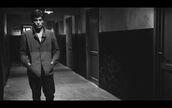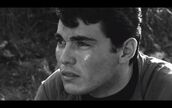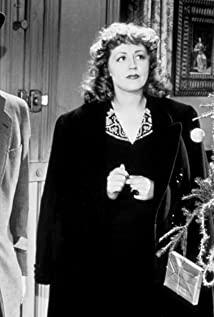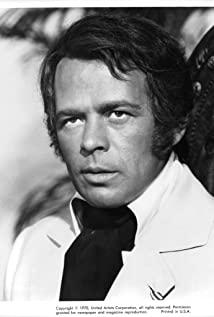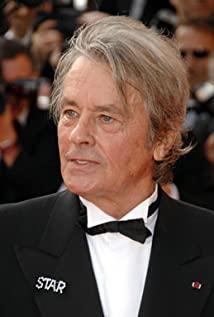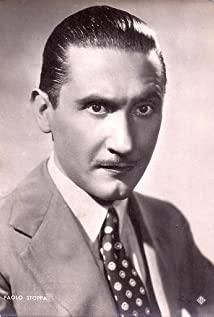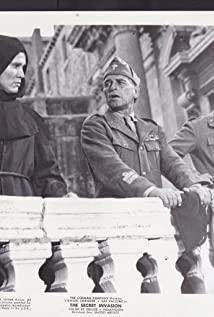Original link
(Actually, the original text is in English, but no one seems to read it, so I translated it)
"Grassie's ashes": Visconti's "Brother Roco" and Pasolini's "Accattone" the presentation of the "rogue proletariat" in 1960
Text/Paola Bonifazio
In Italy during the economic miracle, the view that the “lumpen-proletariat” [lumpen-proletariat] was disappearing once became a general consensus. However, the issue of the identity and presentation of the sub-proletarian [*] still caused much controversy within the Marxist intellectual camp. This article intends to examine how Visconti’s “Brothers Roco” and Pasolini’s “Accattone” constitute a response to this topic, and this response requires them to retell Gramsci’s “Southern” in a new way. Question" thinking. The author will focus on the following two issues, which also formed the basis of Pasolini’s criticism of Visconti’s work in 1960: 1) In view of the fact that Italy has experienced a period of time since Gramsci put forward the theory of "[Worker-Peasant] Union" The series of historical and social changes, how to "represent" the image of the proletarians under the background of these changes; 2) What kind of solutions should be proposed for the "Southern Problem", that is, the theorization in Gramsci's "Notes from Prison" What changes have taken place in the [social] role of intellectuals after work.
【*】Sottoproletariato is actually lumpenproletariat.
In 1926, Antonio Gramsci wrote the "Southern Question" [Alcuni temi della quistione meridionale]. In 1945, Palmiro Togliatti, then general secretary of the Italian Communist Party , published this article in Rinascita magazine. Visconti was very likely to have noticed Gramsci's article when filming "The Earth Was Fluctuating" and "The Roco Brothers". In fact, in an interview in 1960 (sic, full text link ), he did claim that Gramsci's writing inspired these two films. [1] In "Southern Issues", Gramsci emphasized that the working class is responsible for improving the conditions of the peasants in the south. He agrees with the position of the "Communists of Turin" and believes that the union between the industrialized northern region and the southern region dominated by agricultural society means that the peasants and the working class cooperate with each other to [jointly] be responsible for the production of machinery and agricultural and sideline products, and obtain Political leadership. Gramsci did not believe that emigration would solve the problems [of the peasants] in the South. Through "The Earth Was Fluctuating", the author believes that Visconti positively affirmed Gramsci's theory. The protagonist of the story, Anthony, recognizes the need for collective action in Acitrezza, and opposes his brother Cora's choice to leave his homeland in pursuit of the "American Dream". Visconti announced in 1960 that "The Roco Brothers" was a continuation of the Valastro family's story. [2] However, there was a major change in this movie in 1960, that is, the Palundi family had left the south. It can be considered that the narrative starting point of "Roco" represents a historical contingency [historical contingency] shift, and this requires people to express the "Southern Issue" in a brand-new way. In addition, the film did not follow the historical development context of 1948 to 1960. The beginning of "Roco" is not about the migration process of the characters from the south to the north, but uses the direct-pointing core [in medias res] Method: The Palondi family has arrived at Milan Central Station, waiting alone in this monotonous giant fascist-era building. No one came to take them away. When they stepped into the apartment where the Gineta family lived, everyone was surprised that they "found it by themselves." The film uses this fragment to present a real historical moment in an allegorical way: until the other party has moved into the house, the Ginetas "discovered" the existence of these Italian gangster proletariat, that is, the southern peasants; on the surface In the late 1950s, the gangster proletariat, or better said its "remnants", "appeared" in front of the Italians in this way.
In fact, "the demise of the gangster proletariat" was a hot topic of cultural and political debate in the late 1950s. Pierre Paul Pasolini argued in "The Shack" (I tuguri, Vie Nuove , 1958, an excerpt from this article) that the lower proletariat did not "disappear" due to the economic miracle. He believes that the Italian government is unwilling to admit that this group is taking a new form, that is, it has been living in remote areas in the south that have not been noticed, but now it has begun to gather a large number of abject poor people on the periphery of big cities. [3] Pasolini’s film debut "Accattone" was shot in a so-called "shanty town" [borgata], which he defined in 1960 as the "borgata" of the fascist era established by the new government [*] Pirated. The similarity between the new version of "borgata" and the old version is not only in its architectural form, but also in its function as a "concentration camp" to restrict people abandoned by society. In the late 1950s, the Italian government repeatedly criticized neorealist directors for reluctance to "truly reflect the lives of the Italian people." This state of the government is in line with the nationalist ideology of the previous regime. During the filming of "The Earth Is Fluctuating," Visconti and other film directors signed a letter of protest, criticizing that film production is being subject to "fascist" interference and control. [4] Visconti’s worries about the similarity between the new government and the fascist regime seem to be reflected in a scene near the end of the film. The handwriting-a quotation from Mussolini referring to the "people of Italy"-has not been completely removed. In "Roco", the ghettization process of southern immigrants is mainly reflected through the relationship between Palondi and the city of Milan. The family lives "underground" in a "decent" building. When entering the door, the lady in the porter rushed them to the basement as soon as she saw them. She said: "Go down, go down, you have to go down there." [**] The Palundi family moved in the foreground as an obscure black object, while the gatekeeper and another household commented on them. "Exception".
[*] wiki: Le borgate ufficiali di Roma [Official shanty town in Rome], a batch of poor quality houses built by the Mussolini government in a sparsely populated area outside Rome from 1930 to 1937. Resettlement may cause social unrest. Stabilize the crowd and ease the housing pressure in Rome.
[**] In fact, the janitor said: "Underneath, go down, go down, go to the basement". The conversation between the janitor and the residents in the following text:-Mamma mia, have you seen it? A group of Africans. -Where did it come from? -Lucania. -Where is this? Never heard of it. -At the bottom (south side). -Ah, I see, that place is really wasteful!
It can be said that Visconti and Pasolini in their films "Roco" and "Accattone" have shown the "remnant" image of the lower proletariat. [5] The gangster proletariat in the two films also changed relative to Gramsci and relative to the era of "The Earth Is Fluctuating." The author believes that the two directors both proposed how intellectuals can present the "new style" of the proletariat, and the premise that history has proven that society has not developed along the path envisioned by Gramsci (and the generation who experienced the resistance movement) Next, the question of in what sense is Gurdjieff's [in the theory] concept of intellectuals still applicable. The phenomenon of a large number of peasant populations migrating out of the southern region not only affects the artistic presentation of the gangster proletariat, but also affects how to understand the social changes related to it, especially the relationship between this group and the capitalist society.
In the 1958 article "The Shack" mentioned above, Pasolini believes that Italian directors such as Desica, Rossellini [sic] and Visconti have falsified the "reality of the forsaken". Dare to show these extremely unfortunate people in the movie. Two years later, Visconti filmed "Brother Roco", which directly touched on this subject, especially through Simon's story. However, Pasolini was also critical of "Roco", he questioned Visconti's failure to "show more courage in psychoanalysis" (Pasolini 1999, 904, full text link ). [6] Pasolini wrote: "Immigrants from the South, especially the young people among them, are very susceptible to submission and fall into the most direct temptation [provided to them] by the environment in which they have to live. Places: poverty-stricken neighborhoods, urban villages, and even temporary sheds. […] In the worst case, their naive fatalism has evolved into a chaotic rebellious psychology. At least they no longer treat those originally Things that are not sacred are considered sacred.” (Pasolini 1999, 903) [7] In Pasolini's view, "Roco" simply portrays Simon as the "wicked man" among the brothers. The author believes that "Accattone" reflects the director's desire to understand people like Simon. Since the unmodified living conditions of the characters in the film are purely "others" to the director's reality, the film suspends judgments on their behavior, and instead tries to understand their motives within the limits of their living conditions.
Discussing the concept of "labor (work)" [work] can provide examples for the author's explanation. The Italian Constitution states that "labor" [il lavoro, work/labour] is the foundation of the Republic [*]. The previous quotation from Pasolini's article-part of which describes the lower proletariat in Rome, and the other part is a commentary on "Brother Roco"-is a response to a letter from a reader regarding the "labor (work) of southern immigrants" )"problem. The letter was from a Roman citizen who mentioned that southern immigrants could not become permanent residents of [Roman] because they did not have a job, and they could not find a job because they were not permanent residents. The letter here links "labor" to the process of isolation and exclusion of "abandoned people". In the name of "labor (work)"-the foundation established by the Republic-the Italian government was able to shape a new national identity, which would eventually eliminate the capital'people' that existed in "as a whole and as a unified political subject, and As a fragmented collection of the poor and the excluded, the lowercase "people"" (Agamben, "What is the People?") is a break. The author believes that Pasolini's repeated mention of "work" in "Accattone" is a reaction to the government's usage of this term. Accattone and his partners called "work" "blasphemous words"; they laughed at those who have jobs, because they will one day enter the "sacred place" [ie grave]. In other words, the lower proletariat is challenging the notion that "work (labor)" must be equated with "goodness." In this way, Pasolini [puts them] against contemporary capitalist society and the Italian government, the latter two use the same concept as a tool to establish hegemony and cause damage to the lower proletariat. Pasolini further challenged another concept used by the government, that is, human beings are born with a sense of responsibility and morality. He proposed that the mental state of the lower proletariat living in the slum has reached the "pathological level." Pasolini believes that "work (labor)" does not solve their problems. Work is unbearable for Accattone. He yelled on the first day of finding a job: "Is this Buchenwald?" Not only did Pasolini’s view that “borgates” were equated with concentration camps, it also implied that it was a People who are not suitable for labor at all.
【*】The first sentence of Article 1 of the Constitution of the Republic of Italy adopted in 1947: Italy is a labor-based democratic republic. (Italy is a democratic Republic founded on labour.)
This is crucial to Visconti, because as a Marxist, "work (labor)" means to him the way to educate the lower proletariat and maintain "good behavior." An interesting detail is that Rosaria praised Simon in her letter to Rocco for making their family respected among the neighborhood; however, they are most likely to be able to live in Milan because Sirro found a position in the Alfa Romeo factory. Of the house. [8] The author believes that the connection between "work (labor)" and character in "Roco Brothers" is obvious, which is in contrast to Gramsci's "Notes from Prison" titled "Americanism and Fordism [Americanismo e
Pasolini's second criticism of "Roco" involves another character, Ciro. The author believes that Ciro can be considered conceptually as a "variation" on the "theme" of Gramsci's "organic intellectual". In other words, Visconti restated the concept of "organic intellectuals" in the context of new historical possibilities. Gramsci believes that any behavior that "critically" thinks and expresses internally consistent thoughts, no matter who makes it, is the activity of "intellectuals". Gurdjieff further proposed that professional and technical education in the modern world is the basis for creating a new kind of "organic" intellectuals in the working class. Ciro can be called an "intellectual" because he has the ability to observe the real world and independently form a critical understanding of it. In addition, Ciro also played the "role" of an intellectual in his family. He is equivalent to a rationalizing force within the Palundi family. For example, Ciro repeatedly asked Roco to treat Simon's behavior rationally; it was also his attempt to "educate" Luca and persuade his mother to face Simon's problems squarely. However, Gramsci’s view when writing the "Southern Issues" was that the peasants in the south did not have the ability to produce intellectuals organically derived from their own class, and that traditional types of intellectuals or intellectuals generated within the working class had to play a role in the political power ([Communist ] The party) and the lower proletariat play the role of intermediary. In "Roco", Visconti proposes that on the premise that southern farmers enter the big cities, they may independently form a worldview that is higher than "common sense". So Ciro is actually Visconti's independent "creation" based on Gramsci's theoretical model.
Why did Pasolini say "Accattone can't be Siro"? Pasolini attributed the absence of "Siro" [in his movie] to a lack of corresponding technical conditions. More precisely, he refers to the lack of a "language" that can express the process of developing an Accattone-like character into a Siro-like character. When talking about this lack, Pasolini cites two of his novels "A Violent Life" ( Una vita violenta , 1959) and "Street Boy" ( Ragazzi di vita , 1955). He said: "Accattone was born at a moment of strong frustration, that is, the summer when the Tambroni government was in power [*], so in a specific sense, "Accattone" represents a relative difference to "Life of Violence". Kind of retrogression.” (Pasolini 1965, 35). The protagonist of "Life in Violence" decides to join the Communist Party at the end of the novel. But the protagonist of "Accattone" "developed" from being a pimp to being a thief. This "wrong" development reflects that the "common sense" of the character Accattone has not been transformed into what Gramsci calls "good sense". Contrary to the characters in "Roco", the lower proletariat presented by Pasolini is stagnant within their worldview. The author will try to reveal the "reasons" behind it below.
[*] The Tambroni government (1960.3-1960.7) is the only government that has passed a vote of confidence in the parliament by relying on the support of the neo-fascist party MSI since the U.S. Democratic Party came to power. This led to large-scale protests and violent conflicts in many places and was forced to resign in July 1960.
As Marcia Landy emphasized in the book "Film, Politics and Gramsci", "In Gramsci’s analysis of how current and future leadership is formed, the concepts of'common sense' and'true knowledge' are at the core. Status." (Landy, 78) In "The Notes from Prison", Ge Shi thinks that "common sense" is "the folklore of philosophy" [the folklore of philosophy]. In Landy's words: "'common sense' is ambiguous, and it is accumulated from many different levels belonging to philosophy, religion, institutional practice, and individual experience" (78). All members of the Palundi family had what Gramsci called "common sense" at the beginning of the film. It is worth noting that the "common sense" of mother Rosaria has not changed in the whole film. The author believes that [this shows] Rosaria did not decide to leave Lucania and go north to Milan on the basis of forming a "critical consciousness". Gramsci believes that "common sense" is not a negative concept in itself: the problem is that people who have only "common sense", that is, the lack of internal consistency in the worldview, are more likely to obey the ideas instilled in them by leading social groups. Rosaria seems to be an excellent example of this pattern. Her decision to go to Milan to rendezvous with Vincenzo "lacked a critical spirit." At the beginning of the film, Vincenzo said that Rosaria would have waited until he found a job for the other brothers before leaving. Her [hurried] departure reflected uncritical trust in the "economic miracle", and this belief in [economic progress] was accompanied by a backward morality. For example, on the first day her son went to work, she warned them to bring back a lot of money; at the end of the film, she believed that Simon's killing was a "crime of honor" driven by jealousy, showing her attachment to old-fashioned southern morals. [10] When Vincenzo pointed out to her that they should wait before coming to Milan, Rosaria turned his attention to the brooch with a photo of her newly deceased husband: an object with folklore symbolic meaning. On the other hand, Vincenzo’s behavior is also not in line with Gramsci’s performance of gaining “true knowledge”. He criticized his mother's decision, not based on a critical understanding of the economic situation of the entire family, but out of the protection of personal interests, that is, the consideration of his marital relationship with Gineta. When Ginetta's family decided to tear up the marriage contract, Vincenzo did not hesitate to retreat to his "begin" [ie "Old Southern Morality"] and forced her.
"Accattone" believes that the "naive" state of "common sense" itself is to prevent the lower proletariat from uncritically obeying the bourgeois worldview, that is, to prevent them from becoming the only means of the new Rosaria or Vincenzo [, therefore It should be preserved in this state] [*]. In Pasolini's words, the characters in "Accattone" "live in historical consciousness (consciousness), especially outside the consciousness of the bourgeoisie" (Pasolini 1965, 32), so they are still "pure". Pasolini said that the film uses a large number of frontal shots and simple panning shots to create an overall sense of "fixity"-this has become a major feature of his "observation of the world of the poor"- It is consistent with his creative intention to maintain the "purity" of "the elements that play a role in the psychological state of the abandoned". The "purity" of these elements stems from their "unconsciousness" (32). This way of defining the lower proletariat also regards them as living in an ancient era, outside of history and Christian civilization, and echoes Carlo Levi’s "A Place Not Where Christ Is" ( Cristo si è fermato ad Eboli)., 1947) described the peasants in the south; but at the same time, "Accattone" also noticed that the current situation has undergone tremendous changes in the years after the war. Therefore, a character like Stella appeared in the film, her purity [purity] contrasted with Accattone's "naive" [innocence]. When Accattone met Stella for the first time, he said, "You must be from somewhere else. I don't believe you are a Roman. You are so naive and pure. Boh, you are lucky if you don't know this. "In this scene, Accattone expresses Pasolini's nostalgia for an idealized rogue proletariat, and Stella is its representative. But the author believes that the film is always mocking rather than serious about this pure attitude, so this kind of "nostalgia" must not be equated to denying the historical process. Obviously Accattone's innocence has nothing to do with the standard ethics [as a society]. On the contrary, it represents the state in which "common sense" as a polysemous and fluid amorphous substance is still independent of the ideology of the leadership group. Pasolini had a different view of intellectuals. In the poem "The Ashes of Gramsci", he believes that it is impossible for any intellectual to get rid of his/her consciousness of history.
【*】The original sentence at hand (there may be omissions) does not make sense, please fill in according to personal understanding.
The author believes that Pasolini's concept expressed in "Granci's Ashes" has also developed in the movie "Roco Brothers", especially in the character of Roco. In order to discuss this point, we need to first discuss how "common sense" is transformed into "true knowledge". For both Roco and Ciro, this transformation points to the social responsibility of intellectuals. As mentioned above, Ciro played the role of an "organic" intellectual in the Gramsci sense of the film. Roco's story line also discusses the issue of intellectuals' social participation based on the awakening of critical consciousness, but the perspective is completely opposite. The performance of the character Roco has changed greatly in different stages of the film. When talking with Nadia in the coffee shop, he said that the injustice he saw with his own eyes—that is, the arrest of his friend—helped him realize the right to be a man. In other words, he is trying to form a critical worldview. But Roco's experience is far from Siro. He works in a laundry shop, where he seems to be in a state of being separated from the surrounding working space: as the only male in the shop, he is surrounded by a group of women who find him incomprehensible. Unlike Ciro, Roco did not go to school. From the beginning of the film until Nadia was raped, Roco's "engagement" always showed a lack of critical optimism. The way his attitude changed after Nadia was raped shows that his thinking was actually rooted in an irrational belief in "progress." The author believes that Visconti expressed doubts about the concept of "progress" through the development of the character Roco. His other two later works "Leopard" and "Big Dipper" also played this point. But Roco's image does not mean that Visconti yearns for a world of innocence that has been corrupted and lost. On the contrary, the author believes that the theoretical model adopted by Visconti here can still be found in Gramsci's work. Gurdjieff once opposed the concept of "progress" and "becoming", that is, that improvement will inevitably occur along the trajectory of time. Since this concept cannot be supported by reason, once its subject is defeated, such "optimism" will inevitably lead to the opposite "pessimistic" psychology. Therefore, Gramsci believes that the development of history cannot be understood as a trajectory that depends on the existence of the subject [ie The process of the good or bad of individual circumstances, and the [collection] of people must be regarded as a "system". If a person with historical awareness can regard the relationship between the individual and history as a collective experience, he/she can face the worst experience and always maintain "optimism of will." He wrote: "[Thinking] everything is easy, what you want to do can be done, so all of a sudden I want to get all the things that are not there yet.... But what we need is to [violentamente] focus on the status quo. If we still hope to change it.... What needs to be created is such a person, calm and patient, who will not lose hope for the worst horror, and will not be ecstatic at every little bit of trivial joy.” (Gramsci 1975 , Q 9, 60) [*][11] These points of view can be summed up as the motto "intellectually pessimistic, and optimistic in will". When Visconti himself refuted the criticism he mentioned against the film "pessimism", he also declared: "My pessimism is only rational pessimism, and will never be volitional. The more reason is with the help of pessimism Dig deeper into the truth of life, the better the will will be armed with optimism and revolutionary enthusiasm." Roco [in the film] said that as long as one person wants, he can do anything, and [similarly] expressed his desire to have Ideas for everything that is not there yet. The decision to associate with Nadia reflects in this story the optimist's "blind" attitude toward social [development] contingency. Rocco admitted to Nadia that he "did not know beforehand" Simon's feelings for her. After realizing Simon's desperate love, he immediately withdrew. In front of the horrific scene of Nadia being raped, Luo Ke covered his eyes with both hands. Unable to bear the horror brought about by the status quo, he retreated into a more backward ideology, which was fully reflected in the speech about the "olive tree" and "rainbow" in his hometown. The rape incident strengthened his sense of honor and attachment to the family. Even with regard to Simon's rejection at home, his knowledge was expressed with the help of proverbs, and he called it a kind of "sacrifice", emphasizing that his family had no choice but to make a voluntary choice. He no longer believes in human justice; he thinks that Simon's behavior is just a matter of "individual" (infatuation with Nadia, fragility of character, etc.). Ciro's view is completely opposite to Rocco. He believes that Simon is a problem for the whole family, so he tries to find a solution that is beneficial to the whole family. After winning the boxing match for the first time, Rocco said to Ciro: "You don't know how ugly this is." In contrast, Ciro's conversation with Luca at the end of the film shows his Enlightenment (sensible pessimism) also shows his strength (optimism of the will), and the basis of all this is his ability to extract consciousness from his own situation and organize thinking.
[*] The label seems to be wrong. Only the first two sentences of this quotation are from Q 9, 60, and the third sentence is from Q 28, 11.
Interestingly, Gramsci also pointed out that the optimist's attitude towards life is exactly the same as that of the pessimist, because both regard life as "a river with no outlet." Neither optimists nor pessimists believe that the goals of their actions are controlled by chance. Gurdjieff believes that even if an optimist has a purpose, its purpose can only be transcendent. Perhaps it is not accidental that [film arrangement] Ciro called Roco a saint, his goal is "outside history." What is noteworthy about this is not only how to look at the changes in Roco's behavior, but also how to look at the relationship between Roco and Nadia. In my opinion, Nadia and Rocco after the rape incident have the same attitude towards the future. The parallel editing of the boxing match and murder scene was not meant to imply that Roco was responsible for Nadia's death. On the contrary, it seems to corroborate a "parallel" relationship between the two. During the match [boxing coach] Cheri said: "Crazy girl, what are you doing? Why don't you put your clothes on?" The next shot is Simon telling Nadia to "put the clothes on". Rocco sold his body to Cherry for Simon. And Nadia betrayed her body to Simon because of Roco. They have cut off their connection with contingency. When he punched, Roco couldn't see his opponent: because he was driven to fight not for a certain goal but by the anger in his heart. In other words, Roco could not decide his actions based on the need of chance, his actions were only out of the desire to "save" Simon. Nadia was "dead" when she handed herself to Simon (within history). After the rape incident, Rocco also sacrificed himself for Simon, which meant that he had also died (in history). It is worth pointing out that the first encounter between Rocco and Nadia took place on a bus. This is the only time in the film where we see Nadia on a date. This scene seems to constitute an example of Deleuze's "time crystal" (direct time image) concept, because here we are not perceiving time through motion, but experiencing time through images. The relationship between space (street) and object (bus) gives an indirect image of time. In this scene we are "inside" the carriage, out of touch with the outer space. We do not perceive movement, but see (Nadia and Rocco talk, and then the two embrace each other) and "hear" (the musical theme of "bourgeois" is replaced by dominant motives) time. So the movie here suggests that the encounter between Nadia and Rocco—that is, their romantic relationship—is an event that took place "outside history." Moreover, on the bus, we heard not only the music themes that are usually matched with the scenes that show the "bourgeois situation", but also the sound of movies. The dominant motive of music. In the author’s opinion, the former is associated with a “naturalistic” presentation of events within the film’s time, while the latter, as Landy said, “is a kind of, as Deleuze said, that breaks all realism and 'Representation' [representation] is used in a clear cognitive way". Starting from the bus footage, we will never hear the theme of "naturalism" anymore.
Due to space limitations, this article cannot discuss the topic of "realism" in detail, but it is still necessary to point out that both Visconti and Pasolini doubt the concept of "realism" in the classic sense. Therefore, the goal of the two films is not a "faithful reproduction" of reality. That is what the Italian government requires neo-realistic directors to do (also what the fascist regime requires its intellectuals to do). In an article entitled "Anthropomorphic Movies", Visconti explained his "respectful" attitude towards reality. Pasolini’s anthology " Empirismo eretico " ( Empirismo eretico, 1964) clearly expressed this view: "The most abhorrent and the most unbearable—even among the most naive members of the bourgeoisie—is not knowing how to recognize life experience that one does not have. : And to reduce all other life experiences to something that is not essentially different from one's own experience. This is undoubtedly hurting other people who are in different social and historical conditions.” (Pasolini 1988, 87 ) In Pasolini's view, using the camera in a self-referential manner is a "moral" issue. Similarly, Visconti’s use of the language of the melodrama [melodrama] does not allow the audience to equate the director’s subjective presentation with "reality." He regards the director's creation as a "reality of art" [reality of art]. The author of this article believes that Pasolini and Visconti both equated "resemblance" with "affirmation"—Michel Foucault believed that this was the core tension of classical painting— —The concept of "realism" has resisted. Both of them keep away from the audience by repeatedly specifying the "representation" nature of the film. As Sam Rohdie pointed out in his film and writing about Pasolini, "The pimp [in the movie] is not a [real] pimp", but just speaks like a pimp. In other words, the images in motion did not try to "identify" the objects presented through "representation." However, "reality" has broken through the limitations of their "representation" [representation]. Rohdie also commented on the melodrama elements in Visconti’s films: "Melodrama, through theatricalising of reality, not only reveals reality, but also reveals that the emotions it evokes cannot be established or experienced. Unless you stay inside the melodrama—that is, in art rather than life. The overheated fiction of melodrama simultaneously becomes a revelation, protest, and defense of the truth, a place where the value denied or frustrated by reality can still survive." (Rohdie 1992, 23)
Inserting a short digression about Giovanni Testori may help to further clarify the relationship between Pasolini and Visconti and "reality" and "realism." The opening subtitles of "Roco" mentions that the script of the movie is based on Testori’s collection of short stories, "The Bridge of Kisow " [ Il Ponte della Ghisolfa] Some works in the adaptation. During the filming of the film, [screenwriter] Suso Cecchi Damico told [film critic] Guido Astarico that Testori’s text was used after the first draft of the script was completed, in order to The film can better present the reality of the suburbs of Milan. Testori himself also appeared on the set during filming. In the final film, one or two lines are completely copied from Testori’s short story titled "Il ras". [13] There is also a literal quote from another short story by Testori ("Dopo il Match"), from the author's second collection of short stories "Gilda on McMahon Street" [La Gilda del Mac Mahon], but the title does not appear in the opening credits. [14] The same book also contributed to the plot of Morini waiting for Simon after the game, and the name of this character in Testori’s novel is also Duilio Morini [ie Same as the movie]. It's hard to tell exactly how these references should be understood. They undoubtedly partly reveal Visconti's use of Testori's text. The storyline in Tai's pen is very different from "Roco". Considering that the development trajectory of the characters in the film is very different from that of Ty's novel, it can even be said to be the opposite. [*] The author believes that Visconti did not regard Testori’s work as the primary source of the film, but as a need for editing. Into a voice element of the opera-like structure of the whole film. In addition, Cecchi Damico emphasized that the use of Testori's materials is to establish a more direct connection with the characters that need to be expressed, which also illustrates some problems. It is very interesting that Testori once questioned Pasolini's attitude towards the lower proletariat in Rome. He mentioned that Pasolini always had a notebook in his pocket and wrote on it when talking to them. Testori said that he always chats directly with the "forsaken" and only writes down about them when he returns home. He also declared that he "loved" them. On the other hand, Pasolini criticized Testori's portrayal of the poor in Milan as abusive; Testori only sympathized with this group irrationally, and did not want to enter a true sociological analysis. The respective criticisms of the two parties are particularly interesting when they are connected with the way the "Roco" presents the "new" lower proletariat: Visconti's quotation is limited to Testori's text, which means that he rejected the post. The "emotional color" behind the character experience described by the author. The script of "Roco" did not adopt the method of telling the story in Tai's novel. In fact, the author believes that the relationship between Testori and Visconti as the author corresponds to Gramsci's distinction between Catholic intellectuals and Marxist intellectuals. In other words, as a Catholic, Testori "lowered" intellectuals to the people, while Visconti as a Marxist elevated the people to the level of intellectuals-through analysis of discourse and melodramatic language Combine, or use the "language" of "national-popular" to explain the process of a self-consistent scientific thought. [15]
[*] Testori (1923-1993) is one of the most important writers of modern Milan dialect (and its experiment in Italian). He is a pious Catholic homosexual. The plot of the novel referred to in "Brothers Roco", as stated in this article, is far from the movie. Here is a brief summary as follows: The factory owner’s son Morini and Binda, who were born as workers, are a pair of boxers who admire each other. Rini is also a funder of Binda's boxing club. Before the critical match, Morini threatened Binda to give the punch, Binda refused and turned defeat in an extremely unfavorable situation. Self-esteem forced Molini to give up boxing. In revenge, he seduced Binda's sister to make her pregnant, but after confronting Binda, he agreed to compensate for a fee (the plot of "Little Overlord"). After the two broke up, Binda's results got better and better, while Morini indulged in sensuality; but the two people still had their previous desires in their hearts. After a boxing match, Morini hopes outside the court. Helping the opponent to develop his boxing career as a bargaining chip to regain control of Binda, and Binda found that he could not resist this temptation ("After the Match").
To sum up, it can be seen that Pasolini’s view is that Visconti still used the same theoretical paradigm as in 1948 when analyzing the social reality of the late 1950s, which caused the "Roco" to present the Palondi brothers too much. Stylized. Therefore, his criticism can actually be seen as an expression of Pasolini's demand for a new paradigm, that is, he believes that a new paradigm is urgently needed to analyze the current social reality that has undergone tremendous changes. The author of this article believes that both Visconti and Pasolini [trying to] historically understand the problem of the "disappearance" of the proletariat, and their different responses and interpretations to this problem are largely due to the two The difference in the experience of being an intellectual and the concept of literature and art. As a generation of intellectuals who have gone through the age of resistance, Visconti’s understanding of the role of intellectuals is in line with Gramsci’s theory, that is, to solve problems by organizing thought [system]; for him [in the film] characters The role is not a series of individuals but a system, including various relationships. These principles are correspondingly embodied in the narrative structure of "Roco". The Palundi brothers are like "five fingers on one hand": inseparable and homologous to each other (Rosaria). Visconti clearly requested that this sentence be included in the film. The author believes that the audience should not regard the five brothers as independent existence, but should regard them as one, in Gramsci's words, "a system composed of social relations." This "system" allows us to see, for example, that "progress" (Siro) and "decadence" (Simon) are inseparable. In terms of literary and artistic conception, the opera style of "Roco", its use of dominant music motives and parallel editing, all show that the director sees film creation as a process of arranging and organizing a network of different themes. Pasolini belongs to the next generation of intellectuals who were still too young when the resistance movement. On the one hand, his perspective of understanding reality is still "Grassian"; on the other hand, his understanding of Gramsci’s concept of "organic intellectual" Whether school (education) and work (labor) can automatically produce "Siro-style" characters is still applicable has been questioned. His focus is how to find a [new] "language" to express the reality of the "forsaken". Therefore, the foothold of "Accattone"'s literary concept has always been a question of "language": especially the movement and framing of the camera, Pasolini called his "epic-religious" "way of seeing the world".
[related information:
Lucino Visconti "From Verga to Gramsci"
Pierre Paul Pasolini "Answers to Readers' Letters" (Rome's Rogue Proletariat and "The Roco Brothers")
Excerpts from Pierre Paulo Pasolini's "The Shack" (see below)
Giovanni Testori's novel "Il ras" ]
references:
-Agamben, Giorgio. 2000.'What is a people?' In Means without end . Trans. Cesare Casarino and Vincenzo Binetti. Minneapolis: University of Minnesota Press.
-Aristarco , Guido. 1978. Rocco ei suoi fratelli . Eds. Guido Aristarco. Bologna: Cappelli.
-Dall'Ombra, Davide and Fabio Petrangeli. 2000. Giovanni Testori. Biografia per Immagini . Cavallermaggiore: Gribaudo.
-Foucault, Michel. 1983. This is not a pipe. Trans. James Harkness. Berkeley: University of California Press.
-Gramsci, Antonio. 1991. La Questione Meridionale. Roma: Editori Riuniti.
-Gramsci , Antonio. 1975. Quaderni del Carcere. Ed. Valentino Gerratana. Torino: Einaudi.
-Landy, Marcia. 1994. Film, Politics, and Gramsci. Minneapolis: University of Minnesota Press, 1994.
-Landy, Marcia. 1996.'Critical History and the Operatic: The Case of the Leopard.' In Cinematic Uses of the Past. Minneapolis: University of Minnesota Press.
-Pasolini, Pier Paolo. 1965. Pierpaolo Pasolini: An Epical-Religious View of the World . Film Quarterly, Vol. 18, No. 4, 31-35.
-Pasolini, Pier Paolo. 1995. Storie della città di Dio: racconti e cronache romane: 1950-1966. Torino: Einaudi.
-Pasolini , Pier Paolo. 1999. Saggi sulla politica e sulla società . Ed. by Walter Siti and Silvia De Laude .Milano: A. Mondadori.
-Pier Paolo Pasolini. 1993. Accattone. Mamma Roma. Ostia. Milano: Garzanti.
-Rohdie, Sam. 1992. Rocco and his brothers: (Rocco ei suoi fratelli). London: BFI Publishing.
-Rohdie, Sam. 1995. The Passion of Pier Paolo Pasolini. London: BFI Publishing.
-Testori, Giovanni. 1959. Il ponte della Ghisolfa . Milano: Feltrinelli.
-Testori, Giovanni. 1959. La Gilda del Mac Mahon. Milano: Feltrinelli.
-Visconti, Luchino. 1977. "Da Verga a Gramsci (1960)." Visconti: il Cinema. Modena: Ufficio cinema del Comune di Modena.
Author's original note:
[1] See: Lucino Visconti, "From Verga to Gramsci" (1960), in "Visconti's Movies" Visconti: il Cinema , (Modena: Ufficio del Comune di Modena, 1977).
[2] Same as above.
[3] See: Pierre Paul Pasolini, "The Shack", in "The Story of the City of God" Storie della Città di Dio: Racconti e Cronache Romane. 1950-1960, (Torino: Einaudi, 1995) .
[4] This letter is dated December 10, 1947. See "History of Italian Cinema" Gian Piero Brunetta, Storia del cinema italiano (Roma: Editori riuniti, 1993), 83.
[5] It’s worth pointing out that the English translation of Pasolini’s interview with the students and faculty members of the [Rome] Experimental Film Center (1965) is accompanied by an introduction, which reads: “Pasolini’s film works also Including "Accattone", which portrayed a Naples (sic!) pimp in a rough but powerful style..."
[6] This article was originally published in "New Road" on October 1, 1960 [ Vie Nuove , a cultural magazine sponsored by the Communist Party of Italy]. Now included in Pasolini's "Complete Works of Political and Social Review" Saggi sulla politica e sulla società . Ed. by Walter Siti and Silvia De Laude. Milano: A. Mondadori.
[7] The author's self-translated.
[*The Chinese translation of all the quotations that the author translates from Italian is translated from the original on the premise of referring to the English translation. Same below]
[8] Unlike his brother Vincenzo, Ciro is an "employee", and it is almost impossible for Vincenzo who works on a construction site to obtain the same stable employment conditions.
[9] Compared with the script, the dialogue of the film is more jumpy, so it is more difficult to explain with simple causality.
[10] At least as of 1960, but most likely later, murder based on female infidelity is not considered a crime!
[11] The author's self-translated.
[12] The author's self-translated.
[13] See Giovanni Testori's "Little Overlord", in "Kissof Bridge" Il ponte della Ghisolfa . Milano: Bompiani, 1996), 277-307. This book was originally published in 1959 by Feltrinelli. These few words are: "The mouth is as good as a wolf, but the nicotine is too heavy. If you want to punch, [...] can't smoke a cigarette."
[14] "Gilda" was published by Feltrinelli in the same year following "Kiso's Bridge". The original text is: "Still wearing purple [shorts], eh? That is the color of the champion and the heroine..."
[15] Pasolini also paid attention to this issue when using literary materials, but in a different way. The language used by the lower proletariat in "Accattone" is their "common sense", which also contains text fragments from literary works, such as the works of Dante. The film quotes the fifth chapter of Dante's "Purgatory" at the beginning. This chapter describes the conflict between angels and demons around the salvation of a certain soul. In Dante's writings, the devil was finally disappointed, because the soul was rescued only by "a small drop of tears." The plot of Accattone crying in front of the Naples pimp highlights the "national-popular" side of Dante's work.
© Paola Bonifazio
******
Pierre Paul Pasolini: Excerpts from "The Shack"
Desica’s "Roof", Fellini’s "Cabylia Night", and a variety of second-rate neo-realist works: in Italy, I probably can’t find any thoughts about the sheds on the outskirts of Rome. The room has no impression of people anymore.
But the same sentence: In the past ten years, Italian culture has never been truly realism, unless it is limited to a specific field, social commentary or news investigation: all works based on or inspired by Marxism. This kind of realism has only flowed into our artistic creation indirectly, second-hand: whether it is movies, novels, or poetry.
But it has been blurred internally: that is to say, the remnants of other types of culture have mixed in, coexist with it, and perhaps even oppose it. For Desika, it is a kind of pre-fascist humane socialism; for Visconti, it is a kind, if Gramsci’s words are used, “cosmopolitan”, a sense of style; for Fellini, it is a kind of Creative realism [realismo creaturale] or quasi-religious realism [realismo parareligioso].
The fact is that the huts that appear in Italian movies will never be what they really are, whether they are more courageous or not so courageous.
In fact, I think that no writer or director can have enough courage to fully express the reality of the shack: it is so cruel, so unreasonable, and it is of course necessary to make people suspect that what is in front of you is only an "individual phenomenon", which is too special and too special. Secondary. We feel that art seems to be unable to reach certain limits of the human world in terms of humbleness; we also feel that art has no way of expressing certain distortions created by the degraded social environment. [...]
[*Actually, this is a documentary article describing the status quo of shanty towns. The above quote is the first paragraph of this article. 】
Original issue Via Nuove , Roma, 1958.5.24.
Translated from Pier Paolo Pasolini, Romanzi e racconti: 1946-1961 , a cura di Walter Siti e Silvia De Laude, Mondadori, Milano 1998, pp. 1463-1464. See Stories from the City of God: Sketches and Chronicles of Rome 1950-1966 , trans. Marina Hass, 2003, p. 177.
View more about Rocco and His Brothers reviews


